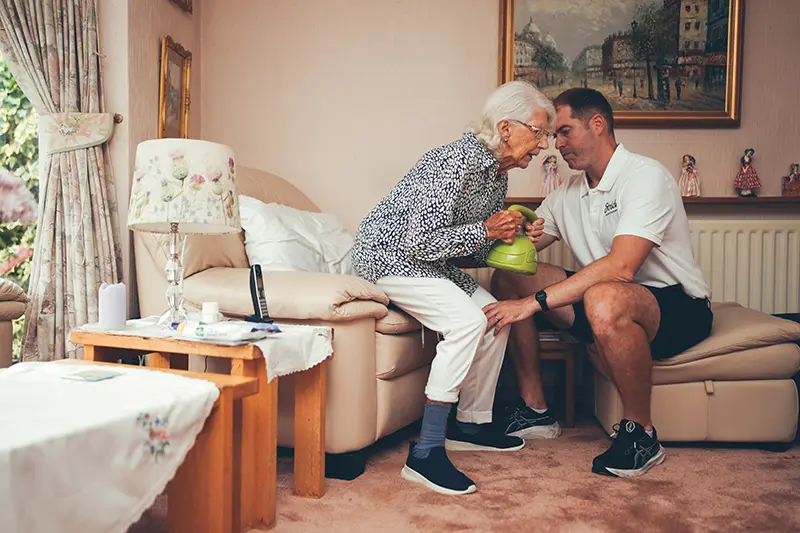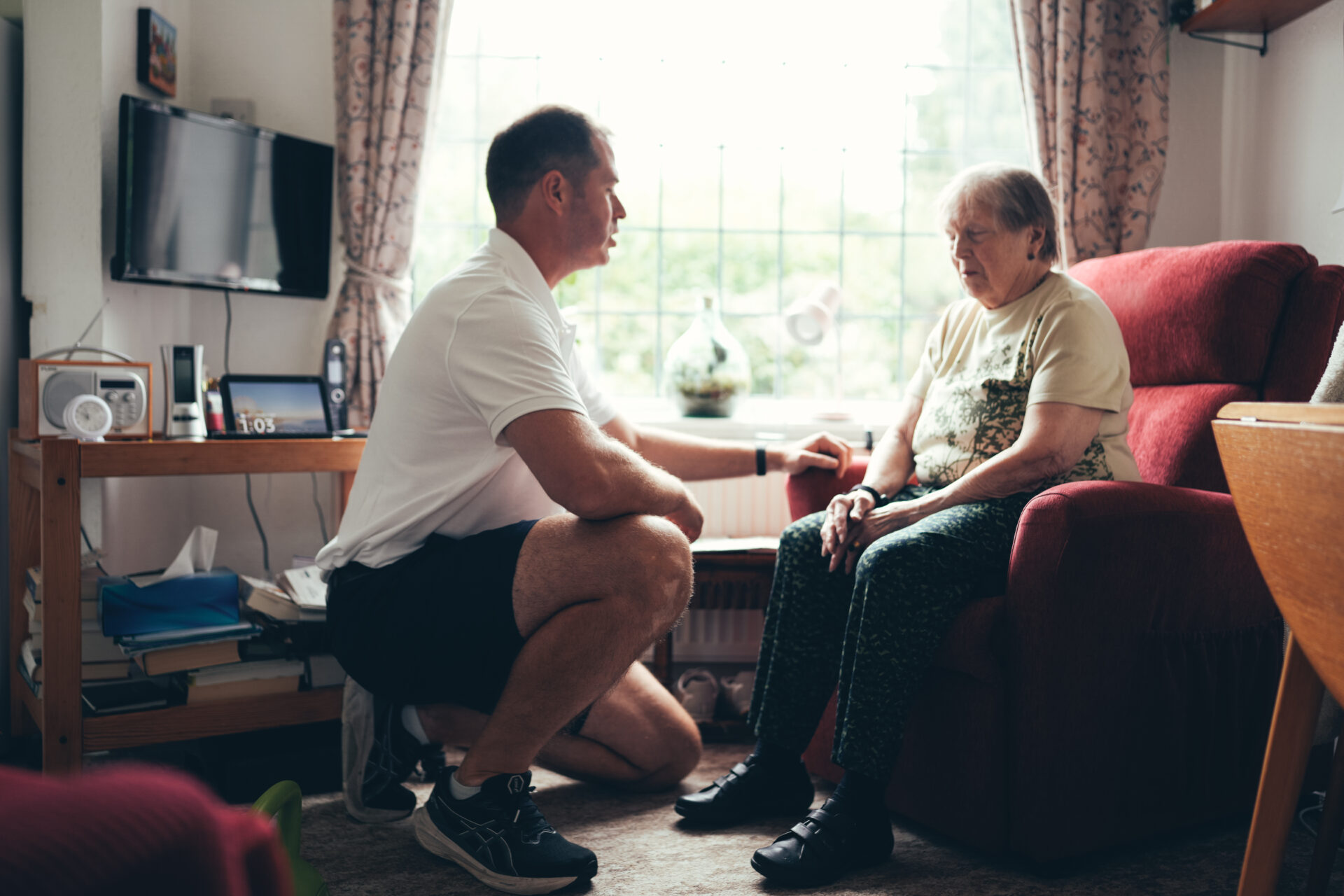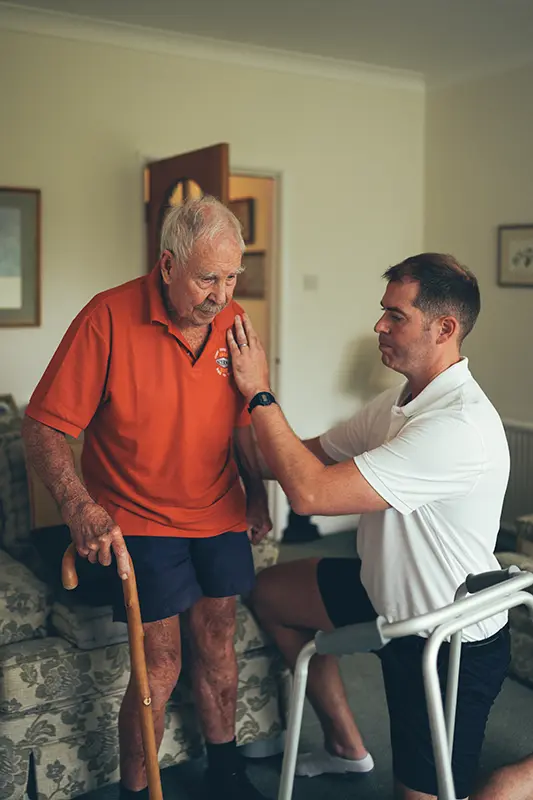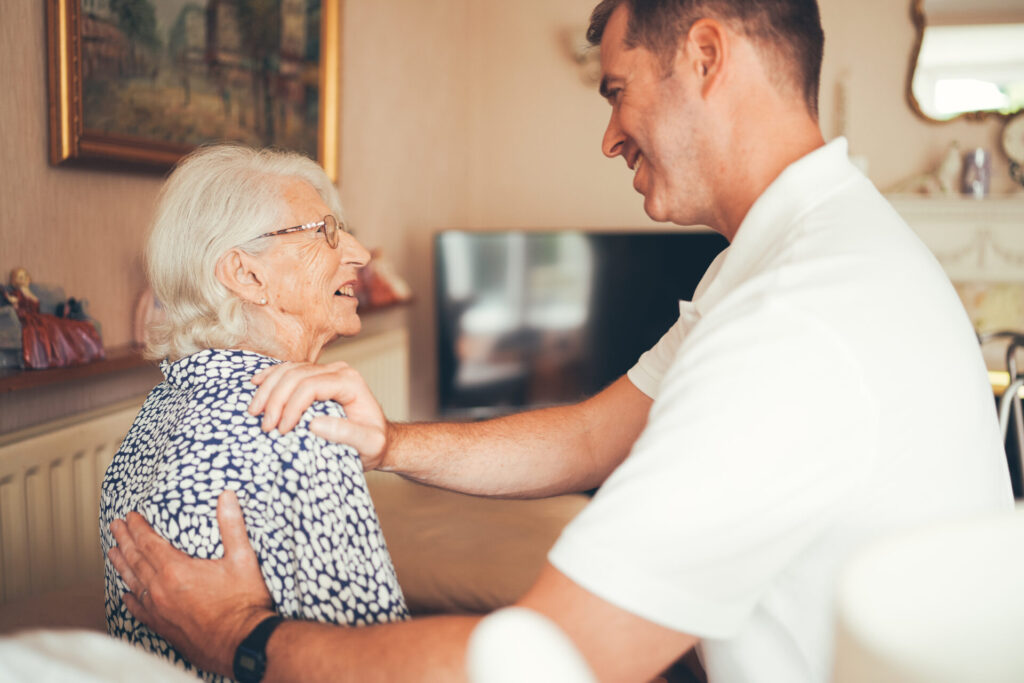After illness or a hospital stay, it’s common to feel weaker, slower, and less steady on your feet. Even a short time in bed can make standing up, walking to the kitchen, or climbing the stairs feel like a real effort.
Physiotherapists call this hospital deconditioning — the loss of strength, balance, and confidence that happens when we’re less active. The good news is that these changes are reversible. With the right support and physiotherapy at home, you can safely rebuild strength, improve balance, and return to your normal life.

Why We Lose Strength After Illness or Hospital Stay
Research shows that even one week of reduced movement can lead to a 10–15% drop in leg strength. As muscles weaken, people often lose confidence and move less, which only makes the problem worse.
Physiotherapy helps to break this cycle by introducing safe, purposeful movement that gradually restores strength and confidence.

The Physiology of Hospital Deconditioning
Spending several days or weeks inactive affects almost every system in the body. Understanding what’s happening inside helps explain why recovery can feel challenging — and why physiotherapy is so effective.
Muscle and Strength Loss
Without regular use, muscle tissue breaks down faster than it’s replaced.
- The quadriceps, gluteals, and calves weaken first, making standing and walking harder.
- Muscle fibres also lose efficiency, so movements that once felt easy start to feel tiring.
That’s why simple strengthening exercises, such as sit-to-stand practice, form the cornerstone of physiotherapy after illness.
- Muscle fibres also lose efficiency, so movements that once felt easy start to feel tiring.
Heart and Lung Changes
The heart and lungs also adapt to inactivity.
- When lying down for long periods, the heart pumps less forcefully, reducing circulation.
- You might feel light-headed or dizzy when you stand up — something called orthostatic intolerance.
- Breathing becomes shallower, and mucus can build up, increasing the risk of chest infections.
Physiotherapists gradually reintroduce activity to improve endurance and breathing efficiency safely.
Bones, Joints, and Soft Tissues
Movement keeps bones strong and joints supple. Without it:
- Bone density can decrease, particularly in the hips and spine.
- Joints stiffen, and connective tissues tighten when not stretched.
The result is stiffness, discomfort, and reduced range of motion. Gentle stretching and mobility exercises help restore flexibility.
- Joints stiffen, and connective tissues tighten when not stretched.
Balance and Coordination
Balance relies on constant communication between the inner ear, eyes, and body. When you move less, these systems become less responsive.
- Reaction times slow, posture feels less stable, and everyday tasks can feel unsteady.
Physiotherapy retrains these systems, helping you feel more confident and in control.
- Reaction times slow, posture feels less stable, and everyday tasks can feel unsteady.
The Psychological Side
Physical changes are only part of the picture. Many people also feel anxious, frustrated, or afraid of falling after illness. These feelings are completely normal — and they can slow recovery if not addressed.
Physiotherapists work to rebuild not just strength, but also trust in your body — restoring the confidence that movement is safe and beneficial.

How Physiotherapy Rebuilds Strength and Confidence
Physiotherapy is about much more than exercise. It’s a structured process that helps your body and mind recover together.
After illness or a hospital stay, physiotherapy can help you:
- Regain strength and stamina with tailored, progressive exercises.
- Improve balance and stability to reduce your risk of falls.
- Restore confidence through guided movement and reassurance.
- Maintain independence so you can do more for yourself each day.
At Stride Physiotherapy, based in Solihull, we specialise in helping older adults recover at home after illness, surgery, or injury. Every session is personalised to what matters most to you — whether that’s walking to the garden, climbing stairs, or feeling steadier when you stand.
Why Home Physiotherapy Works So Well
Recovery feels most meaningful when it happens in your own environment.
- You can practise real-life movements using familiar furniture.
- There’s no need to travel when you’re still regaining strength.
- Family members or carers can observe and offer support.
Many of our patients say that having physiotherapy at home gives them more confidence and helps them progress faster. It makes rehabilitation feel practical, achievable, and personal.
What to Expect from a Home Rehabilitation Plan
Every person’s recovery is unique, but most home physiotherapy programmes include:
- Initial Assessment — Checking strength, balance, and mobility, and identifying what limits daily activities.
- Goal Setting — Creating meaningful, realistic goals like “walk to the end of the garden” or “get up from my chair without help.”
- Tailored Exercise Programme — Strength and balance exercises that progress safely at your pace.
- Functional Practice — Practising daily movements such as standing, walking, and reaching safely at home.
- Education and Support — Advice on pacing, posture, breathing, and staying active between sessions.
- Confidence Building — Regular encouragement and feedback so you can see your progress clearly.

A Physiotherapist’s Perspective
Written by Richard Waterworth, Physiotherapist & Advanced Clinical Practitioner, Member of the British Geriatrics Society.
Over the years, I’ve seen countless people lose strength during illness — but I’ve also seen how quickly that strength can return with the right rehabilitation.
One patient, recently discharged from hospital, could barely stand at first. With a few weeks of consistent, tailored exercises, she was walking to her garden again with confidence.
Recovery isn’t about pushing harder; it’s about moving safely and consistently. That’s the power of physiotherapy.
Key Takeaways
- Deconditioning affects muscles, joints, balance, and confidence — but it’s reversible.
- Physiotherapy for older adults helps rebuild strength and independence after illness or a hospital stay.
- Home physiotherapy in Solihull offers comfort, safety, and meaningful recovery.
- Starting early makes recovery faster and prevents long-term decline.
Ready to Begin Your Recovery?
If you or a loved one are finding it hard to regain strength or confidence after illness or a hospital stay, Stride Physiotherapy can help.
We offer home physiotherapy for older adults in Solihull, designed to rebuild mobility, prevent falls, and restore independence.
Book a free 10-minute advice call today and start feeling stronger, steadier, and more confident at home.
